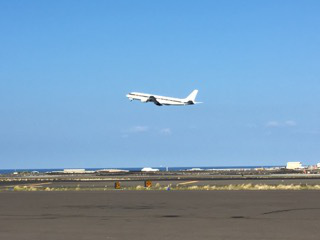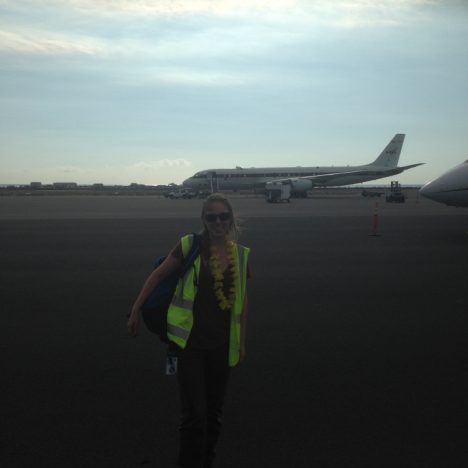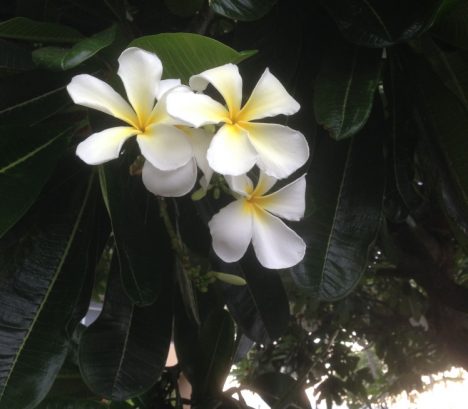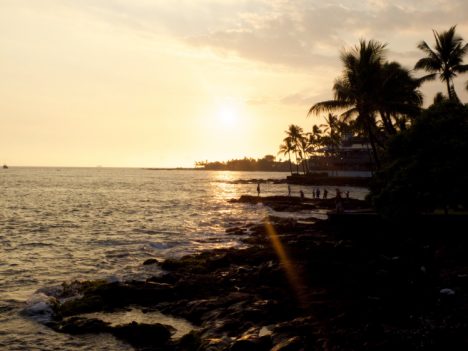
The DC-8 departs Kona for American Samoa (credit: Dave Jordan)
The other day I had a unique and difficult experience. I was on the tarmac at Kona International Airport, Hawaii, and I watched the DC-8 take-off, with all my colleagues, our crew and my instruments on board. This wasn’t planned, and no, I hadn’t just missed my flight.
Somewhere between California and Alaska I caught a seemingly innocuous cold. Then somewhere between Alaska and Hawaii this cold stopped me from being able to equalize the pressure in my ears. On a normal flight this can be extremely painful and can risk lasting damage to the ear drum and hearing. On a flight where you simulate take-off and landing 8 times … well you can imagine.
We’d been told in our safety briefings to mention ear discomfort to the crew should it arise, so after waiting a little bit too long because I wanted to tough it out and not cause a fuss (very ill advised, don’t do that) I mentioned this to the crew. They immediately showered me with all kinds of medication to help and techniques to equalize pressure and reduce pain. This, and being able to ask the pilots to pause and level out for a bit when we were going down, got me through a few more descents, but the pain became really unbearable in the end.
The project principal investigator, Steve Wofsy, and crew came up with a plan to do our last descent in stages, leveling out every few hundred feet to make it less painful for me as well as being a new and excellent way for some of the instruments on board to sample the atmosphere. By leveling out for five or ten minutes at a time, they could collect samples at unique altitude levels for later comparison to see the vertical structure of the atmosphere here. I’m so glad it worked out that way.

Me having successfully landed in Hawaii with both eardrums intact (credit: Maximilian Dollner, University of Vienna).
We had two hard down days in Hawaii before flying to Samoa and I felt sure I’d recover in time. I thought things would clear up on landing, but they didn’t, and I spent the next morning in urgent care, getting prescriptions for antibiotics and steroids. I slept a lot and tried every trick in the book to clear my ears. However, nothing was improving.
Just in-case, I trained two of my colleague on running my instruments, and hatched a plan with my supervisor back in Colorado that if I couldn’t take the flight on Saturday, I’d fly commercial to New Zealand the next day and catch up there to do some maintenance and hand over properly to my colleague who’s scheduled to fly the second half.
I desperately wanted to be on that flight to Samoa. The last 14 months of work have been all preparing for this. I love the excitement of the flights and watching the data come in, the camaraderie among the team, seeing all these new and different places. I also hate the idea of not being strong enough for something, it’s a bug-bear of mine. Above all, this mission is too important to mess up.
And that’s when I realized, the mission really is too important to mess up. And that means, if its not sensible to fly, I do not fly. If I flew with bad ears and the pilots had to divert the course every instrument on that plane loses data. If I arrive in Samoa with a burst ear drum, not only is it much harder to deal with, but I’m a greater risk flying on subsequent missions because of the weak spot.
If I don’t fly, actually I’m proud to say, my instruments do pretty fine without me now. We did a lot of work to ensure they automatically cope with all the pressure changes and other challenges of the flights, and it has paid off. And the features I notice along the way, well I get so darn excited about them I tend to explain them to anyone who’ll listen, so my colleagues can spot a lot of them for me after five flights together now. We have a chat link set up with the DC-8 while it flies, so for each of the two flights I’ll miss I’ll be online on the ground diagnosing any issue that come up for the instruments and helping out my colleagues who are kindly running them for me.
I tried until the last minute, even during the pre-flight meeting to equalize my ears, although I’d told the science and mission directors the previous evening that if there wasn’t a dramatic improvement I would not be flying. They didn’t equalize. In fact they still haven’t. My team are in American Samoa, preparing to fly to New Zealand and I’m in Hawaii on strict medical advise not to fly for three more days. I won’t even catch up in New Zealand. Instead, I will fly back to Colorado as soon as my ears allow.

Plumeria flowers on Kona, Hawaii (credit: Christina Williamson)
As science gets to be more about successful collaborations, given the large scale and complex nature of the questions we’re now addressing, being a good scientist becomes more about good team work. This is no place for personal heroics or thinking you’re not expendable. Sometimes, a little humility and discretion can go a long way.

Sunset on Kona, Hawaii (credit: Christina Williamson)
Christina Williamson blogs regularly about the ATom Mission and other adventures in atmospheric science at christinajwilliamson.wordpress.com and tweets as @chasingcloudsCW.




a really useful post for others in a similar situation. Hope it all gets better soon
Hi we r following your progress so fun wahoo sorry about probably for your friend I love seeing your adventute
Oh, I feel for you! Had something similar happen in one of my flights, except it wasn’t just my ears but one of the sinus cavities in my head. Thought that portion of my skull was going to explode along with my ears leaking brain matter. Excruciating. The pain lasted another four days after I was on the ground, and I was grounded for 2 weeks. In a strange city. Alone. But it turned out to be a great 2 weeks and I did all the touristy-travel things you normally don’t have time to do, and also met some wonderful people during excursions.
That’s a really tough call, and this is a well-written perspective following a good decision. Better luck next time, and I hope the data gives you lots of interesting things to figure out even if you missed the flight.
I commend your wise decisions, and I wish you a swift recovery! Kind regards from Houston, Texas.